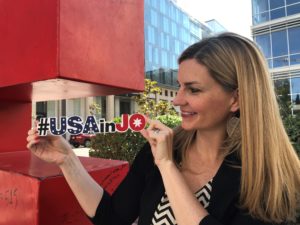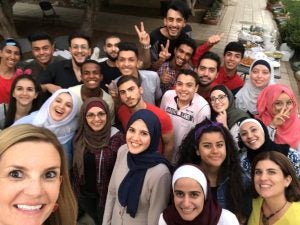
Alum Kala Carruthers Azar, who serves as Assistant Cultural Affairs Officer at the U.S. Embassy in Amman, writes about the important role of people-to-people exchanges to American soft power.
By Kala Carruthers Azar
When the rhetoric of American politics reverberates overseas and U.S. foreign policy decisions are unpopular in certain places, Cultural Affairs Officers at U.S. embassies work to direct attention toward the good that America has to offer local populations. I’m thankful to have a job that lets me work on the grassroots people-to-people relationships that still make American soft power attractive.
I often tell people I have the best job in the embassy: I get to bring amazing Americans to Jordan to interact in creative ways with Jordanian audiences. Through comedy, sports, music, dance, and entrepreneurship, we increase the crucial face-to-face connections between Americans and Jordanians that underpin our bilateral relationship. Despite challenging economic times and a youthful desire to leave in search of opportunity overseas, there is a growing network of civil society organizations and talented individuals building and maintaining a stable Jordan. We get to help bolster those individuals and organizations with modest federal assistance grants and with workshops, training, and exchanges that build their capacity and ability to advocate.

We enlist envoys with distinctive American talent—such as athletes, film/TV producers, theatre performers, improv artists, hip hop dancers, gospel singers, entrepreneurs, and jazz musicians—to serve as cultural ambassadors with voices that resonate more than ours, as government officials, ever could. They connect on a different level, offering genuine American perspectives on their lives, multiculturalism, respect for others, and empathy. When policies get ugly, our programs provide an outlet and a unique example reinforcing the importance of not only freedom of expression in various forms, but also how the arts are a community service.
A recent favorite was collaborating with a local media academy to offer an improv and sketch comedy workshop with trainers from Chicago’s famous Second City Training Center for some of Jordan’s top comedians and aspiring amateurs, all in need of theoretical training. I also love the passionate hip hop workshop participant who told me that the t-shirt given to him by a visiting hip hop band the embassy sponsored 12 months prior is still literally worn every day because each of the neighborhood kids takes a turn. Seeing Step Afrika! teach Palestinians and Jordanians African American stepping while they, in turn, taught the envoys dabkeh, reminded me of the power of experiential learning and tangible cultural exchange. Our programs find and create harmonies, showcase up-and-coming art forms, encourage a variety of professions as the Jordanian economy grows, and strengthen the power of an active citizenry.
When everyday Americans and Jordanians come together through a shared art form or common interest, diplomacy is able to trump politics and forge new relationships. As Former Deputy Secretary of State William Burns once said: “Diplomacy is no longer just about relationships with and between governments… our relationships outside of government — with unions, youth, business leaders, religious figures, and minority groups — are just as important. Local populations and civil society are where it’s at.”
Kala Carruthers Azar graduated from the MAAS program in 2009 and is now a Foreign Service Officer. She is currently serving as Assistant Cultural Affairs Officer at the U.S. Embassy in Amman, Jordan.
This article was originally published in the Spring 2019 CCAS Newsmagazine.